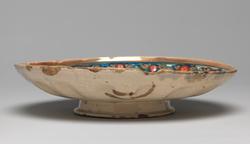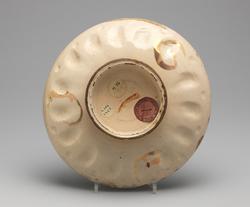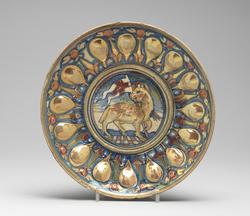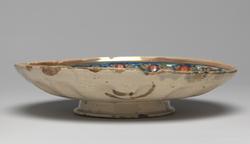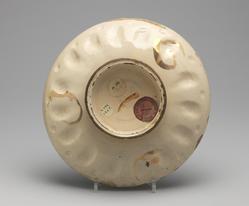Current Location: Gallery 6 (Upper Marlay): case 3, shelf C
Maker(s)
Workshop:
Maestro Giorgio Andreoli
Entities
-
Bowl
- shallow bowl standing on a low foot
- coppa
Categories
Description
Lustred maiolica bowl standing on a low foot, moulded in relief with the Agnus Dei, surrounded by oval leaves, and stylised plants with buds.
Buff earthenware, moulded with decoration in relief and tin-glazed pale beige overall. Painted in blue, and with red and coppery-gold lustre. Circular with shallow curved sides and convex boss surrounded by a rib, standing on a low foot. In the middle, within a circular lustred rib, the Agnus Dei, bearing a pennant with a red cross, stands on a red and white chequered pavement. Behind him is a blue skyline and blue striated sky with lustre strokes on it. On the sides, radiating oval leaves alternate with stylised plants bearing spherical buds reserved in a blue ground. A lustre band encircles the rim. The back is decorated in coppery-gold lustre with a stroke in the middle, and three swirls on the sides.
Notes
History note: Lord Hastings; Christie's, 20-21 March 1888, Catalogue of majolica, Palissy ware, German stoneware, Limoges enamels, the property of The Right Hon. Lord Hastings of Melton Constable, Norfolk, probably either lot 15, lot 31, or lot 47 (the size corresponds to lot 31, but not the description). From 1912, Frederick Leverton Harris (1864-1926) by whom bequeathed .
Legal notes
F. Leverton Harris Bequest, 1926
Measurements and weight
Diameter: 24.7 cm
Height: 5.8 cm
Acquisition and important dates
Method of acquisition: Bequeathed
(1927)
by
Harris, Frederick Leverton
Dating
16th Century, first half
Renaissance
Circa
1530
CE
-
1550
CE
Note
Label text from the exhibition ‘Madonnas and Miracles: The Holy Home in Renaissance Italy’, on display at The Fitzwilliam Museum from 7 March until 4 June 2017: ‘Agnus Dei’, meaning ‘Lamb of God’, symbolises Christ the sacrificial lamb, who died to take away the sins of the world (John 1:29). In the Renaissance, ‘Agnus Dei’ also referred to wax discs impressed with the image of the Lamb of God. Made in Rome from the remains of the Easter candle at St Peter’s Basilica, they were distributed by the pope to the faithful and are frequently listed in household inventories, sometimes preserved in decorative cases.
The Agnus Dei (Lamb of God) is one of several stock motifs found on the central medallions of Gubbio moulded dishes (coppe), whose sides are decorated with a variety of radiating relief motifs such as leaves, buds and rays. Further examples are in the National Museums of Scotland, Edinburgh, the Victoria & Albert Museum, the Walters Art Gallery, Baltimore, the Museo Civico, Pesaro, and the Musée des Arts Décoratifs, Lyon. Another was formerly in the Adda collection.
School or Style
Renaissance
Components of the work
Decoration
composed of
high-temperature colour
( blue)
reduced pigment lustre
( copper appearing red)
reduced pigment lustre
( silver-yellow, appearing coppery-gold)
Materials used in production
Tin-glaze
Earthenware
Techniques used in production
Moulding
: Buff earthenware, moulded with decoration in relief, and fired for the first time. Tin-glazed pale beige overall, painted in blue, and fired for the second time. Lustred in red and coppery-gold lustre before reduction firing.
Tin-glazing
Inscription or legends present
Inscription present: circular, rose pink
- Text: in the centre 'LORD HASTINGS', and round the outside 'MUSEUM*ART TREASURES EXHIBITION*' printed in black '122' inscribed in faded ink, 'M 36' in pencil
- Method of creation: Printed in black, inscribed in faded ink and pencil
- Type: Label
Inscription present: circular
- Text: 'M.36/' in ink, 'Leverton Harris./Bequest/1926' in pencil
- Method of creation: Inscribed in blue-black ink and pencil
- Type: Label
References and bibliographic entries
Related exhibitions
Identification numbers
Accession number: C.106-1927
Primary reference Number: 79245
Stable URI
Audit data
Created: Saturday 6 August 2011
Updated: Wednesday 25 November 2020
Last processed: Tuesday 2 September 2025
Associated departments & institutions
Owner or interested party:
The Fitzwilliam Museum
Associated department:
Applied Arts
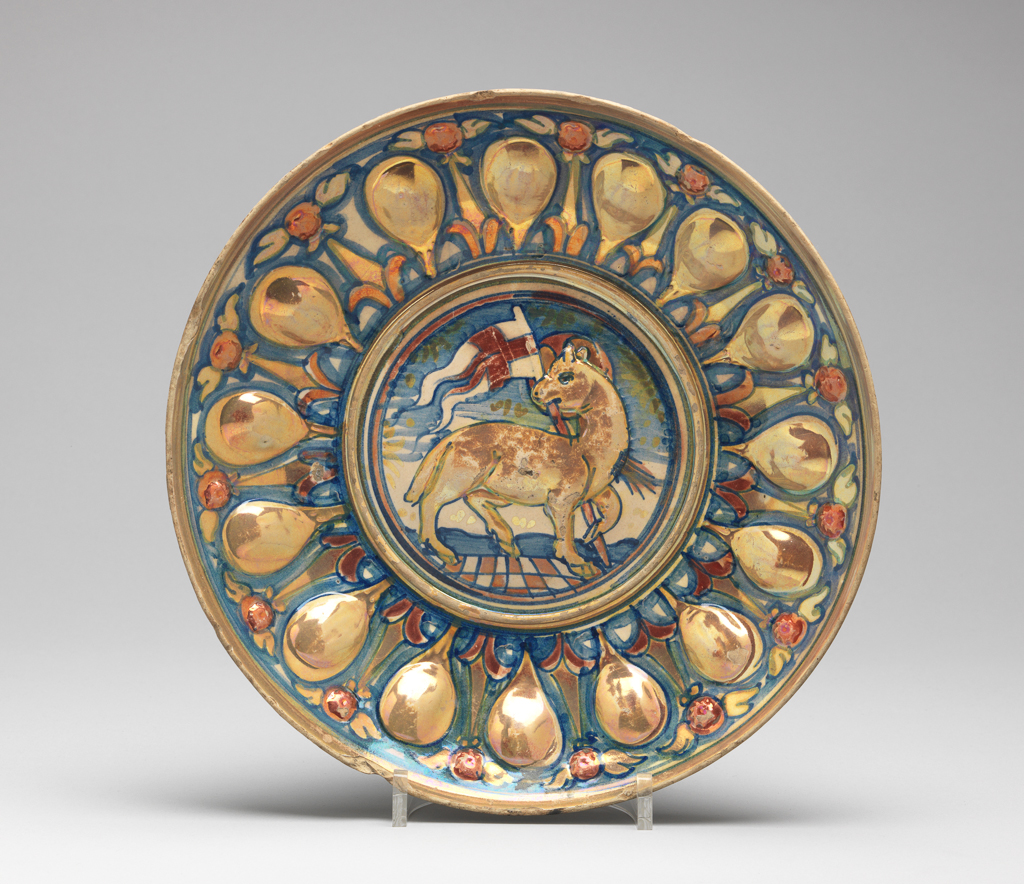
 IIIF Manifest
IIIF Manifest
